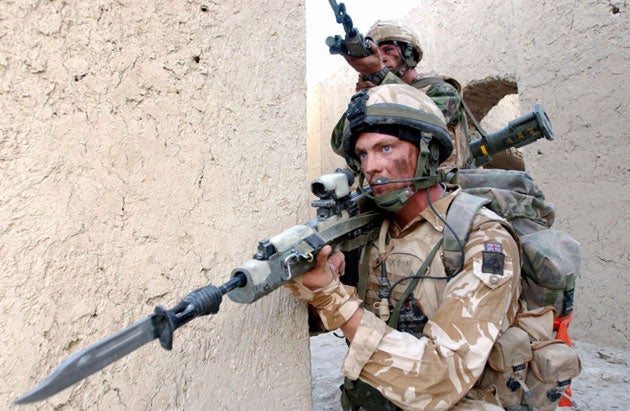Iraq trauma is a time bomb, says ex-SAS author

Your support helps us to tell the story
From reproductive rights to climate change to Big Tech, The Independent is on the ground when the story is developing. Whether it's investigating the financials of Elon Musk's pro-Trump PAC or producing our latest documentary, 'The A Word', which shines a light on the American women fighting for reproductive rights, we know how important it is to parse out the facts from the messaging.
At such a critical moment in US history, we need reporters on the ground. Your donation allows us to keep sending journalists to speak to both sides of the story.
The Independent is trusted by Americans across the entire political spectrum. And unlike many other quality news outlets, we choose not to lock Americans out of our reporting and analysis with paywalls. We believe quality journalism should be available to everyone, paid for by those who can afford it.
Your support makes all the difference.Andy McNab, the former SAS soldier turned author, has warned that Britain faces a social crisis because of the mental trauma suffered by veterans of the Iraq and Afghan wars.
"This is not something new, people have been suffering from some form of post-traumatic stress disorder for years from past conflicts, yet we still don't have anything like an adequate system for looking after them," McNab told The Independent.
He said that the Government's ongoing neglect of its soldiers' mental health when they come back from front-line action would lead to unprecedented levels of mental illness, and in some cases suicide – as had happened with several of his Special Forces colleagues.
"I've seen for myself the appalling way our soldiers are hung out to dry," he said. "The idea held by the Government that the majority of service personnel experience a smooth transition into civilian life is largely false. Living in the outside world when discharged is very hard and many personnel experience huge difficulties reintegrating."
McNab's comments coincide with the release of an opinion poll which showed that two-thirds of participants view the Government's treatment of former service personnel as "disgraceful". Three-quarters of those questioned believed the psychological care for veterans was "inadequate", 72 per cent felt the level of compensation for those injured was "insulting" and 49 per cent were prepared to pay a penny extra income tax in the pound to provide financial help for returning soldiers. McNab said the figures showed overwhelming public support for the military which was not being reflected by officials.
McNab, who shot to fame in 1993 with his first book Bravo Two Zero, is publishing his memoirs, Seven Troop, in which he looks at what has happened to his SAS comrades. He told The Independent that two former comrades, Frank Collins and Nish Bruce, committed suicide. Another, Tommy Shanks, killed his girlfriend with an AK-47. "All these incidents took place between seven and 10 years of them leaving the forces," he said. "This shows just how vital it is to have a screening process to diagnose how these people have been affected.
"With the deployments in Iraq and Afghanistan, we are going to have around 140,000 people serving there. Some will be affected and we are looking at a time bomb in years to come.
"These people need to be looked after in a military environment. The Conservative government in the early 90s began to shut down the military facilities and began farming care out to the NHS to cut costs. That has not worked."
McNab pointed out that a growing number of ex-service personnel are ending up in prison. "This is such a waste," he said. "Surely the Government would prefer to spend the money to treat these people and give them a chance than spend it on their upkeep in jails?"
The shadow Defence Secretary, Liam Fox, spoke of Britain's "shabby treatment" of veterans. He said: "Part of our national renewal should be a commitment to better respect and to honour those willing to put themselves in danger for our security and safety."
A Ministry of Defence spokesman insisted that "the vast majority of service leavers make a smooth transition to civilian life and 94 per cent find full employment within six months. We recognise though that some do experience difficulties and the Ministry of Defence works closely with service charities to support veterans. Robust systems are in place to treat and prevent post-traumatic stress disorder."
Join our commenting forum
Join thought-provoking conversations, follow other Independent readers and see their replies
Comments